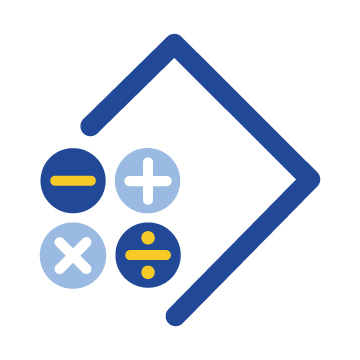Resources
-
Council of the Great City Schools. (2021). How Well Do Large City Public Schools Overcome the Effects of Poverty and Other Barriers? Retrieved from https://www.cgcs.org/Page/1288
National Center for Education Statistics. (2023). PISA 2022 Mathematics Literacy Results. Retrieved from https://nces.ed.gov/surveys/pisa/pisa2022/mathematics/trends/
National Council of Teachers of Mathematics. (2012). Closing the Opportunity Gap in Mathematics Education. Retrieved from https://www.nctm.org/uploadedFiles/Standards_and_Positions/Position_Statements/Opportunity%20Gap.pdf
-
DC Office of the State Superintendent of Education. (2022). 2022 DC State Plan Accountability Addendum. Retrieved from https://osse.dc.gov/sites/default/files/dc/sites/osse/page_content/attachments/2022%20DC%20State%20Plan%20Accountability%20Addendum%20%20-%20Appendix%20A%20%28Adjusted%20Long%20Term%20Goals%29.pdf
DC Policy Center. (2024). 2022-23 State of DC Schools: Challenges to pandemic recovery in a new normal. Retrieved from https://www.dcpolicycenter.org/publications/state-of-dc-schools-2022-23/
District of Columbia Public Schools. (2023). A Capital Commitment: 2023-2028 Strategic Plan. Retrieved from https://dcpsstrong.com/strategic-plan/
District of Columbia Public Schools. (2024). Early learning curriculum & assessment. Retrieved from https://dcps.dc.gov/ece
Zearn. (2023). Students in District of Columbia Public Schools gained an additional 11 weeks of math learning in one year with Zearn. Retrieved from https://webassets.zearn.org/Implementation/EfficacyResearch2022DistrictwideStudyDC.pdf
-
Conceptual Understanding, Procedural Knowledge, and Math Fact Fluency
Boaler, J., & Staples, M. (2008). Creating mathematical futures through an equitable teaching approach: The case of Railside School. Teachers College Record, 110(3): 608-645. Retrieved from https://ed.stanford.edu/sites/default/files/boaler__staples_2008_tcr.pdf
Geary, D.C., Hoard, M.K., Nugent L., & Bailey, D.H. (2013). Adolescents’ Functional Numeracy Is Predicted by Their School Entry Number System Knowledge. PLoS ONE 8(1): e54651.
National Council of Teachers of Mathematics. (2023). Procedural Fluency: Reasoning and Decision-Making, Not Rote Application of Procedures Position. Retrieved from https://www.nctm.org/uploadedFiles/Standards_and_Positions/Position_Statements/PROCEDURAL_FLUENCY.pdf
Osana, H.P., and Pitsolantis, N. (2013). “Addressing the Struggle to Link Form and Understanding in Fractions Instruction.” British Journal of Educational Psychology 83 (March): 29–56.
Woodward, J. (2006). Developing automaticity in multiplication facts: integrating strategy instruction with timed practice drills. Learning Disability Quarterly, 29(4): 269-289.
High-Quality Instructional Materials, Deployed Coherently EdReports. (2024). Reviews of K-12 instructional materials. Retrieved from https://www.edreports.org/reports/math
McGee, D.L., Gonulates, F., Hodgson, T., & Brewer, M. (2020). The long term impact of a coherence based model for mathematics intervention. School Science and Mathematics, 120(4), 220-231.
Narechania, K. (2022). Instructional coherence isn’t a trendy reform. It’s necessary—and it works. Fordham Institute Flypaper. Retrieved from https://fordhaminstitute.org/national/commentary/instructional-coherence-isnt-trendy-reform-Its-necessary-and-it-works
Newmann, F. M., Smith, B., Allensworth, E., & Bryk, A. S. (2001). Instructional Program Coherence: What It Is and Why It Should Guide School Improvement Policy. Educational Evaluation and Policy Analysis, 23(4): 297-321. https://doi.org/10.3102/01623737023004297
O'Donnell, C. L. (2008). Defining, conceptualizing, and measuring fidelity of implementation and its relationship to outcomes in K–12 curriculum intervention research. Review of Educational Research, 78(1): 33-84.
TNTP & Zearn. (2021). Accelerate Don’t Remediate: New Evidence from Elementary Math Classrooms. Retrieved from https://tntp.org/wp-content/uploads/2023/02/TNTP_Accelerate_Dont_Remediate_FINAL.pdf
Mathematical Mindset and Confidence
Dweck, C. S. (2006). Mindset The New Psychology Of Success. Random House.
National Council of Teachers of Mathematics. (2012). Closing the Opportunity Gap in Mathematics Education. Retrieved from https://www.nctm.org/uploadedFiles/Standards_and_Positions/Position_Statements/Opportunity%20Gap.pdf
Rattan, A., Good, C., & Dweck, C. S. (2012). “It's ok — Not everyone can be good at math”: Instructors with an entity theory comfort (and demotivate) students. Journal of Experimental Social Psychology, 48(3): 731–737.
Wu, Y. (2016). Universal Beliefs and Specific Practices: Students’ Math Self-Efficacy and Related Factors in the United States and China. International Education Studies, 9(12): 61-74. Retrieved from https://files.eric.ed.gov/fulltext/EJ1121512.pdf
Student Scheduling and Data
Biesinger, K. D., Crippen, K. J., & Muis, K. R. (2008). The impact of block scheduling on student motivation and classroom practice in mathematics. The Journal of Educational Research, 101(3): 140-147.
Higgins Averill, O., Baker, D., & Rinaldi, C. (2014). A Blueprint for Effectively Using RTI Intervention Block Time. Intervention in School and Clinic, 50(1): 29-38.
Institute for Educational Sciences. (2009). Using Student Achievement Data to Support Instructional Decision Making. Retrieved from https://ies.ed.gov/ncee/wwc/Docs/PracticeGuide/dddm_pg_092909.pdf
Teacher Preparation and Ongoing Development
Darling-Hammond, L., & Bransford, J. (Eds.). (2005). Preparing teachers for a changing world: What teachers should learn and be able to do. Jossey-Bass.
Darling-Hammond, L., Hyler, M. E., & Gardner, M. (2017). Effective teacher professional development. Learning Policy Institute. Retrieved from https://files.eric.ed.gov/fulltext/ED606743.pdf
Goertz, M. E., Olah, L. N., & Riggan, M. (2009). From testing to teaching: The use of interim assessments in classroom instruction. Consortium for Policy Research in Education.
Hill, H. C., Rowan, B., & Ball, D. L. (2005). Effects of teachers’ mathematical knowledge for teaching on student achievement. American Educational Research Journal, 42(2): 371-406.
National Council on Teacher Quality. (2022). Preparation for Teaching Elementary Mathematics. Retrieved from https://www.nctq.org/dmsView/NCTQ_Teacher_Prep_Review_Preparation_for_Teaching_Elementary_Mathematics_2022
-
Click Here to view materials from the 2024 DC Math Summit.

